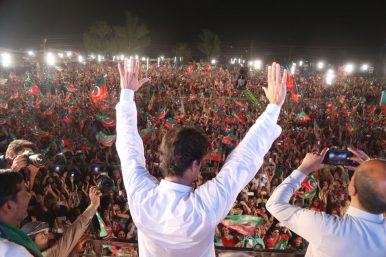By Harsh V. Pant
In the end, there was no proverbial twist in the tale. Imran Khan’s victory in Pakistan’s recent general elections was being predicted by most and it turned out to be true. The Pakistani military, which had shaped the electoral battlefield in Khan’s favor, was, of course, the real winner as it managed to make it clear to the civilians that anyone who would dare to cross swords with it would end up languishing in jail like former Prime Minister Nawaz Sharif. For now, Khan has won the electoral battle, but he still will have to seek out allies to form a coalition government. This is a remarkable turnaround from the previous parliamentary elections in May 2013, when his party, the Pakistan Tehreek-e-Insaaf, or PTI, had come in third.
Reacting to general election results, Sharif, serving 10 years in jail on charges of money laundering, alleged that the polls had been “stolen” and warned that the “tainted and dubious” results would have a “bad impact” on the country’s politics. But that’s the lament of a leader whose gamble on generating a sympathy vote in his party’s favor failed. The Pakistani voter, with considerable help from the military, has brought Imran Khan to the helm of affairs in the country.
While Khan’s charisma and communication skills did help, it was his outreach to the military that ultimately paved the way for his prime ministership. Khan had denounced the Afghan war as the “wrong war” and his party PTI protested against the supply route provisions to the United States. His advocacy in favor of the Taliban was so strong that he was chosen by them as their representative in peace talks with the Pakistani government. He denounced Sharif in the strongest terms and gave political legitimacy to the military’s anti-Sharif agenda.
In return for this, the Pakistani military prepared the ground for Imran Khan’s prime ministership. It went and virtually decimated the PML-N. And then it helped Khan by mainstreaming various extremist groups. It propped up the Tehreek-e-Labbaik, which advocates strict anti blasphemy laws. Other globally ostracized groups like the Lashkar-e-Taiba (LeT) and Lashkar-e-Jhangvi were propped up under different guises. Even the founder of Harkat-ul-Mujahideen (HuM), Fazlur Rehman Khalil, came out in support of Khan and the PTI. Not surprising, therefore, that the rise of Imran Khan was in more ways than one foreordained.
Since his victory, Khan has been quick to talk of making Pakistan’s institutions stronger and promising accountability for everyone. He has promised to make a “Naya Pakistan,” which would be an Islamic welfare state. On the question of India, Khan suggested that the blame game between the two countries over Kashmir and Balochistan needed to stop, claiming: “If India takes one step toward us, we will take two steps toward them…but at least [we] need a start. Right now, it is one-sided where India is constantly just blaming us.”
But challenges abound on the issue of governance, the central plank of Khan’s campaign, and they will come to the forefront soon for the new government. The economy is tanking, with a sinking rupee and growing deficit. Pakistan will have to go to the International Monetary Fund (IMF) for a bailout package. Pakistan’s growing global isolation is a challenge too and India has made it a point to diplomatically wage a campaign against it at various fora. Relations with the United States are on a downward spiral, though Washington has said that it will “look for opportunities” to work with the new leaders of Pakistan after they form a government, and will try to advance security, stability, and prosperity in South Asia. In the meantime, Pakistan has been grey-listed by the terror finance watchdog Financial Action Task Force (FATF). Internal security is volatile with an escalating Shia-Sunni rivalry and growing imprint of Islamic State.
Pakistan’s relations with China remain key to its economic future. In its official statement, China suggested that it hoped Pakistan would maintain political and social stability and concentrate on national development. The investments China has made as part of the China-Pakistan Economic Corridor will be central in this evolving dynamic. There is trouble on the ground and projects are languishing. Beijing will be hoping that a stable government can give these projects much needed impetus. China had recently lent Pakistan $1 billion to boost the South Asian country’s plummeting foreign currency reserves.
The biggest challenge for Imran Khan, however, will be to manage Pakistan’s always tense civil-military equations in a way that allows him to complete his full term in office. If the military has built him, it can also do away with him. After all, Nawaz Sharif was ousted partly for opening a treason case against General Pervez Musharraf.
For India, in the meantime, it will be more of the same. Before next year’s elections, there will be hardly any appetite in New Delhi for any bold overtures toward Pakistan. The question from India’s perspective would be whether it can manage the turmoil on the border. Pakistan’s nuisance value remains high and it can very easily bring India from an emerging power to one which is focused on South Asia. A broader transformation in Pakistan toward civilian supremacy and the Army’s marginalization, something many had hoped for after the elections in 2013, is nowhere in sight. The Pakistani military is now more firmly ensconced in the saddle than ever before. In fact, learning from the past, it has begun to act smarter by working through the backdoor.
The challenge for India and the world is how it can manage the negative externalities emerging out of Pakistan’s internal turmoil. If there is any message in Imran Khan’s victory, it is this: the more things change, the more they remain the same in Pakistan.

No comments:
Post a Comment